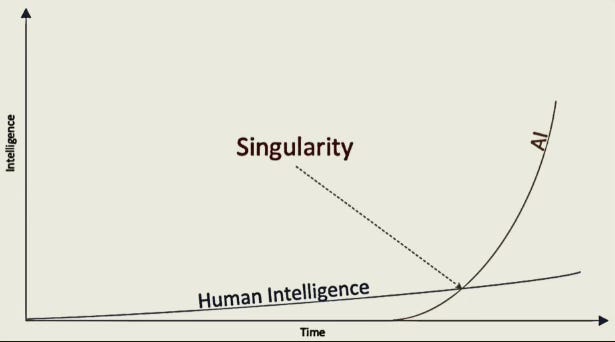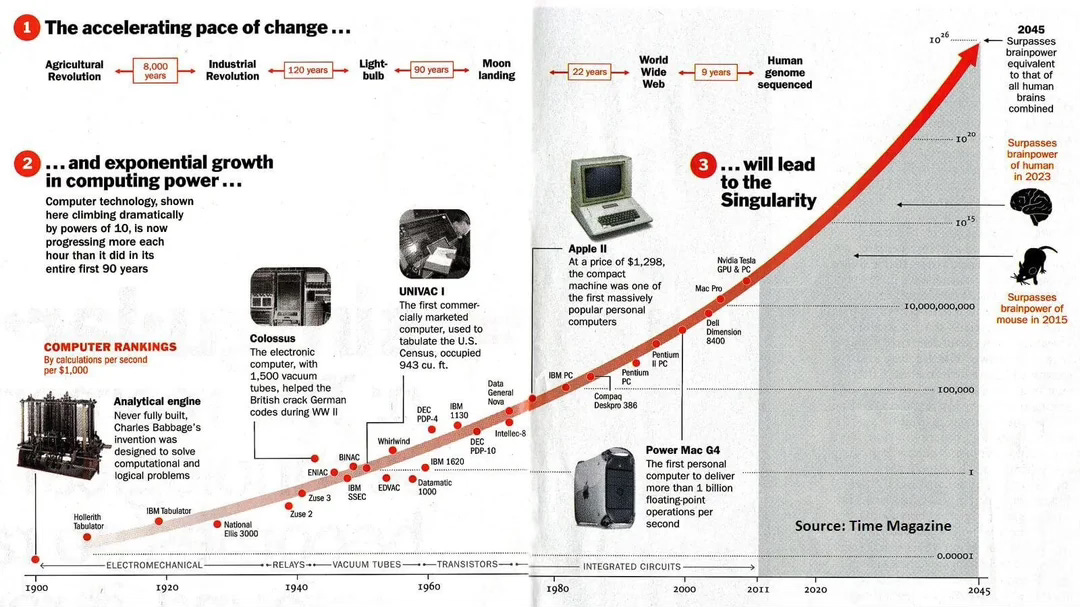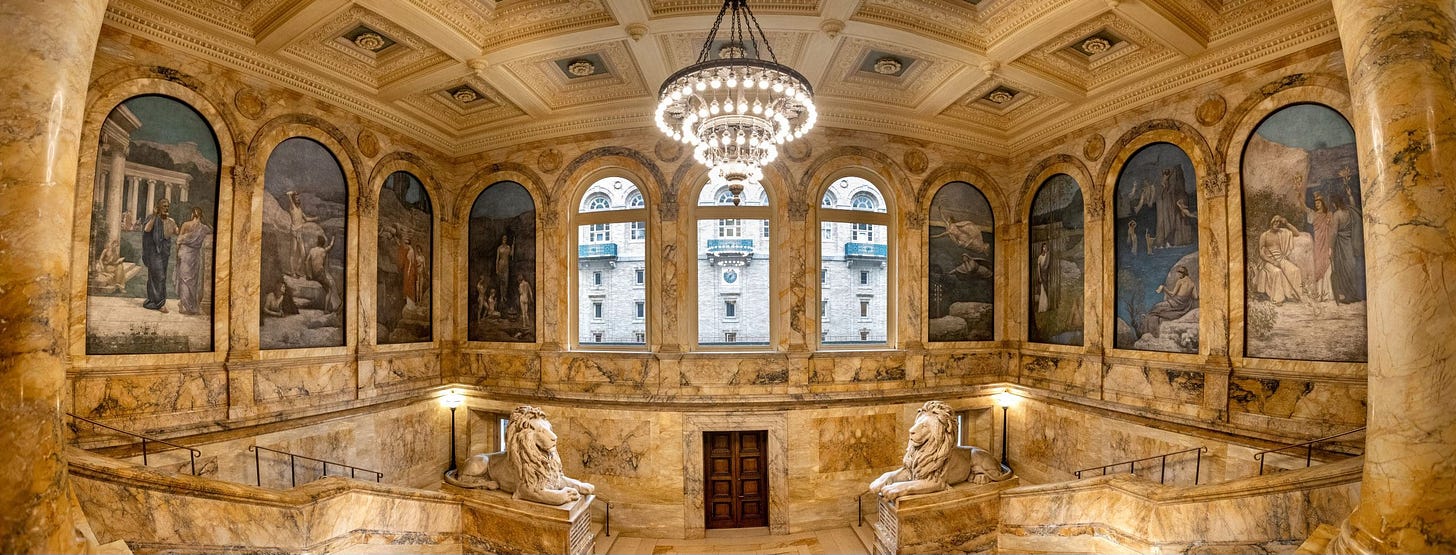Consciousness.
This is the common answer as to what separates robots, artificial intelligence and other advance technologies from humans, animals and other living beings.

Singularity
Ray Kurzweil, the tech guru and futurist, is pretty famous for predicting that by around 2045, we'll hit the "technological singularity"—that point where AI will surpass human brains in intelligence, totally changing life as we know it. Imagine AI that doesn't just mimic brain power but rockets past it, continuously improving itself and possibly solving huge global issues like disease and poverty.
Kurzweil thinks this leap in AI, along with major advances in robotics and biotech, could even beat his own timeline because everything's moving faster than expected.
He’s had a solid track record with his predictions before. Back in the '90s, he predicted the dominance of the internet and smart phones, and he even foresaw that a computer would beat the best human chess player by 2000 (Deep Blue beat Kasparov in 1997).
Gone are the days when it was clear whether we were interacting with a robot or a human.
Now, when we watch a video, the first question that might come to mind is whether we're seeing AI-driven CGI or an actual person. The distinction is becoming increasingly difficult, prompting us to question the very nature of reality as we consume digital content.

The Intelligence Race
The evolution of technology intelligence really breaks down into three stages:
Rules-Based Systems - These are the basics, where machines follow strict, predefined rules to perform tasks. Think of a thermostat programmed to adjust the room temperature at certain times.
ChatGPT and Advanced Learning Systems - A leap forward, these systems like ChatGPT can think and process information, learning from interactions to improve over time.
The Singularity - The final frontier, where AI potentially surpasses human intelligence. Imagine a future where AI develops cures for diseases or solves complex global issues autonomously.
How do we adapt to a world where our gadgets seem to know us better than we know ourselves?
The Final Stage of Humanity
As a consultant and investor, I've spearheaded the integration of artificial intelligence, algorithm trading softwares, , and other cutting-edge technologies into daily life, business workflows, new income streams and investment strategies for my clients.
It's remarkable to see how (Taylor) swiftly these advanced technologies have transitioned from mere science fiction to becoming focal points in our everyday discussions—from soon to be eye-catching Super Bowl commercials (I predict multiple crypto commercials too) to casual locker room chats and family/friend get togethers.
Our phones are smarter, our cars are driving themselves, and homes are outfitted with sophisticated devices, and our phones and apps often know what we need before we even say it. This leap from futuristic fantasy to everyday reality has not only streamlined traditional processes but has also opened up exciting new avenues for innovation, more income and investment opportunities.
Uniformity’s Paradox
Efficiency often imposes uniformity—but the hidden costs might be time, identity, and true value.
Have you noticed how everything, from Airbnb rentals to office buildings, is starting to look the same? It’s all about efficiency and mass appeal—a smart business strategy, but one that frequently sacrifices uniqueness. The same trend is creeping into social media, where I believe the new trend for 2025 will be no trend. The social media experiment seems to be winding down, leaving us asking: Who and what is real? Who and what is fake?
It’s a deeper reflection on simplicity versus substance. Are we trading depth and authenticity for convenience and conformity?
Take the Boston Public Library, for example. Its intricate design and craftsmanship make it not just a building but a cultural masterpiece, a testament to the value of individuality and purpose. Now compare that to modern libraries—often designed for cost-efficiency and speed, but stripped of the distinctiveness that once defined them.
This drift toward uniformity might also foreshadow what’s to come with the technological singularity—when artificial intelligence surpasses human intelligence. As AI begins shaping our world, it may prioritize efficiency above all, further standardizing our environments and diminishing the diversity of human creativity.
While technological progress is remarkable, we must have a serious conversation about preserving our human and cultural uniqueness in the face of increasing uniformity. How do we ensure the human touch thrives in a world increasingly shaped by algorithms? It’s a delicate balance, and one we must navigate carefully as we move forward.
(See the photos below for a visual comparison: the Boston Public Library’s timeless artistry versus the ‘streamlined’ functionality of a modern library.)
Investing in the Immortality or Extinction
For those looking for a list of key opportunities to invest in the potential of the singularity, focusing on sectors and companies at the forefront of AI and Machine Learning, Biotechnology and Genomics, and Robotics and Automation.
AI and Machine Learning
NVIDIA (NVDA): GPUs and AI infrastructure leader.
Alphabet (GOOGL): Google AI and DeepMind pioneer.
SingularityNET (AGIX): Decentralized platform for AI services.
Fetch.ai (FET): Autonomous agents for logistics and DeFi.
Global X Artificial Intelligence & Technology ETF (AIQ): AI-focused ETF.
Biotechnology and Genomics
CRISPR Therapeutics (CRSP): Gene-editing technology leader.
Illumina (ILMN): Genomic sequencing innovator.
Moderna (MRNA): mRNA tech for advanced medicine.
GenomesDAO: Decentralized platform for genomic data.
ARK Genomic Revolution ETF (ARKG): Genomics and biotech ETF.
Robotics and Automation
Boston Dynamics: Advanced mobility robotics.
iRobot (IRBT): Consumer robotics (e.g., Roomba).
Fanuc Corporation (FANUY): Industrial robotics leader.
Global X Robotics & Artificial Intelligence ETF (BOTZ): Robotics and AI ETF.
Broader Innovators
Microsoft (MSFT): Partnered with OpenAI, advancing AI.
Tesla (TSLA): Robotics and AI-driven solutions like Optimus.
Faith in the Creator
The Bible reminds us in Isaiah 45:9 that the creation can’t surpass or overthrow its Creator: “Does the clay say to the potter, ‘What are you making?’”
It’s a powerful reminder that boundaries exist for a reason—and ignoring them often leads to trouble.
We see this lesson in the story of Icarus. He was warned not to fly too close to the sun, but his ambition got the better of him. The wax in his wings melted, and he fell to his death. Nature teaches the same thing—ecosystems thrive when boundaries are respected.
When something goes beyond its role, it throws everything out of balance. As we face massive changes like the singularity, where AI could surpass human intelligence which could reshape society, these lessons feel more relevant than ever. Pushing innovation without clear limits or ethics might lead to breakthroughs, but it also risks losing control over what we’ve created.
Boundaries aren’t restrictions—they’re safeguards.
They help maintain balance and purpose, whether in mythology, nature, or modern life. As we embrace these big shifts, the challenge will be creating responsibly, ensuring our progress doesn’t come at the cost of what makes us truly human.
At the end of the day, my life’s motto is simple: make sure I, and those I inspire, don’t end up doing it All For Nothing.
Stay Blessed
Tyler Bossetti
P.S. — If you want to connect further, feel free to follow me on Instagram and send me a DM! I love connecting and chatting with you all. Your support truly means the world to me, and I look forward to hearing from you!






